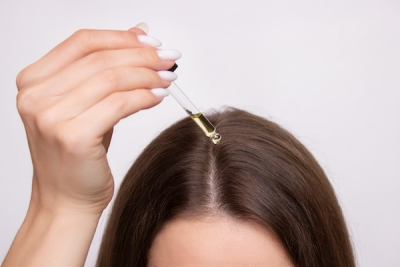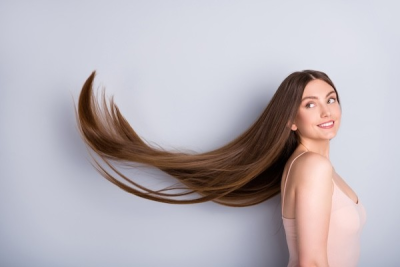How to support hair growth? Natural products and effective strategies!
Author: Lucie Garabasova
Are you looking for ways to support hair growth and improve its quality? Fortunately, there are several natural methods and products that can contribute to healthy hair growth. These products include hemp oil, hemp protein, hemp shampoo, vitamin C, and Reishi mushroom. In this article, we will explore how these products work and how they can be part of your hair care routine.
What are the best products to support hair growth?
To promote hair growth, it is essential to properly nourish the scalp, strengthen hair follicles, and improve overall hair health.
Here are some of the best products that are generally considered effective in supporting hair growth:
1. Shampoo and conditioner
- Biotin shampoo: Biotin is a B vitamin that is essential for hair health. Biotin shampoos help strengthen hair and promote growth.
- CBD shampoo: This shampoo helps combat hair loss and is suitable for any skin issues on the scalp.
- Caffeine shampoo: Caffeine stimulates hair follicles and increases blood circulation in the scalp, which may support hair growth.
- Keratin shampoo: Keratin helps restore hair structure, strengthens it, and prevents breakage.
2. Oils and serum
- Argan oil: Rich in vitamin E and fatty acids, it hydrates hair and the scalp, promoting healthy hair growth.
- Hemp oil: Hemp oil is rich in omega-3 and omega-6 fatty acids, which are crucial for scalp and hair health. These essential fatty acids help hydrate the scalp, improve circulation, and support hair follicle growth. Hemp oil can be applied directly to the scalp as a massage oil, improving circulation and adding shine and strength to the hair.
- Coconut oil: Hydrates and protects hair from damage, which can lead to stronger hair and promote growth.
- Castor oil: Contains ricinoleic acid, which improves blood circulation in the scalp and supports hair growth.
- Essential oils (Rosemary, Lavender): Used in small amounts, often mixed with carrier oils, to stimulate hair growth and improve scalp health.
3. Dietary supplements
A balanced, quality diet positively affects hair growth.
- Hemp protein: Hemp protein is an excellent source of protein, which is essential for hair growth and renewal. Protein is a fundamental building block of hair, and having enough in the diet can support hair growth and strength. Adding hemp protein to your diet, such as in smoothies or baked goods, can help ensure your body has the necessary nutrients for healthy hair.
- Vitamin C: A powerful antioxidant that helps protect hair cells from damage caused by free radicals. It is also important for collagen production, which is key for hair structure. Adequate vitamin C intake, from sources like citrus fruits, strawberries, or supplements, can strengthen your hair and support its growth.
- Reishi mushroom: Known for its adaptogenic properties that help the body cope with stress. Stress can be a contributing factor to hair loss. Taking reishi may help reduce stress and promote healthy hair growth. Reishi is also known for its ability to improve circulation, which can benefit the scalp and hair follicles.
- Biotin supplements: Biotin is crucial for the growth of hair, skin, and nails. Dietary supplements with biotin can help improve their growth and strength.
- Folic acid: Supports healthy cell renewal and hair growth.
- Combined vitamins and minerals: Special formulas containing vitamins A, C, D, E, zinc, iron, and other nutrients.
4. Hair masks
- Avocado masks: Rich in vitamins and minerals that nourish hair and the scalp.
- Yogurt masks: Contain proteins and lactic acid, which strengthen hair and improve elasticity.
TIP: Try our proven hair masks with hemp oil.
5. Other products
- Derma rollers: Small needles on a roller stimulate the scalp and support hair growth by improving blood circulation.
- Special brushes: Brushes with natural bristles or massaging functions can help stimulate the scalp and improve circulation.
How to use products effectively?
Follow these rules to support hair growth:
- Regularity: For the best results, it is important to use products regularly and over the long term.
- Combination of different methods: Combining shampoos, oils, dietary supplements, and a healthy diet can provide comprehensive support for hair growth.
- Individual needs: Choose products that suit your hair type and scalp needs. Everyone has different hair types and skin sensitivity, so it's good to experiment.
How long does it take to grow 10 cm of hair?
Considering the average hair growth rate of 1 to 1.5 cm per month, we can estimate the time needed to achieve a length of 10 cm:
- At a rate of 1 cm per month: Growing 10 cm of hair would take approximately 10 months.
- At a rate of 1.5 cm per month: Growing 10 cm of hair would take approximately 7 months.
What health conditions can affect hair growth?
Hair growth can be influenced by various health conditions and factors that can cause hair loss, weakening, or slow growth.
These can include:
1. Hormonal imbalance
- Androgenetic alopecia (male and female pattern baldness): This genetically conditioned form of hair loss is caused by hair follicles' sensitivity to dihydrotestosterone (DHT), a derivative of testosterone. It is common in men but also affects women.
- Polycystic ovary syndrome (PCOS): Women with PCOS experience hormonal imbalances that can lead to thinning hair.
- Pregnancy and menopause: Hormonal level changes during pregnancy and menopause can affect hair growth and density
2. Thyroid disorders
- Hypothyroidism: An underactive thyroid can lead to thinning hair and breakage.
- Hyperthyroidism: An overactive thyroid can cause hair loss due to accelerated metabolism and hormonal changes.
3. Autoimmune diseases
- Alopecia areata: An autoimmune condition where the immune system attacks hair follicles, leading to sudden hair loss in small patches.
- Lupus: An autoimmune disease that can cause inflammation and damage to hair follicles, resulting in hair loss.
4. Nutritional deficiencies
- Iron deficiency anemia: A lack of iron can weaken hair and cause hair loss, as iron is essential for hemoglobin formation, which transports oxygen to hair follicles.
- Protein deficiency: Proteins are the fundamental building blocks of hair, and their deficiency can lead to weakness and hair loss.
- Vitamin deficiencies (e.g., Biotin, Vitamin D): Vitamins play an important role in hair growth and renewal, and their deficiency can negatively impact hair health.
5. Stress and mental health issues
- Chronic stress: Long-term stress can lead to telogen effluvium, a condition where more hairs than usual enter the resting phase and subsequently fall out.
- Trichotillomania: A psychological disorder in which an individual pulls out their hair, leading to hair loss and damage.
6. Skin disorder
- Seborrheic dermatitis: An inflammatory skin condition that can cause itching, dandruff, and hair loss.
- Psoriasis: An autoimmune condition that can affect the scalp and cause hair loss due to inflammation and scaling.
7. Medications and treatments
- Some medications may have side effects that include hair loss.
How does genetics affect hair growth?
Genetics plays a significant role in hair growth, and people are interested in how genetic factors may influence their ability to have thick and healthy hair, as well as whether there are ways to overcome genetic predispositions.
These questions and interests reflect a holistic approach to hair care that includes both external care and internal health and lifestyle.




